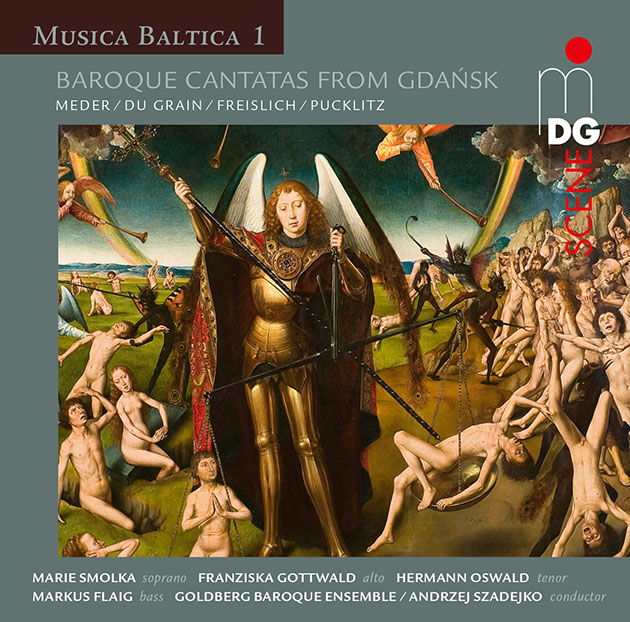2017 - Musica Baltica I. Baroque Cantatas from Gdansk

Johann Valentin Meder
pro festo S. Michaelis archangeli: Singet, lobsinget mit Hertzen und Zungen a 11 PL-GD Ms. Joh. 192
Meder’s Singet, lobsinget evokes a festive atmosphere; the more extensive selections from Freislich and Pucklitz show a decent stylistic range and pleasing ingenuity. The performance underlines these qualities – ‘professional’ may sound like a criticism with faint praise, but I mean it here entirely positively– Fabrice Fitch, Gramophone
Johann Jeremias du Grain
Hertzlich lieb hab ich dich o Herr PL-GD Ms. Joh. 187
Johann Balthasar Christian Freislich
Jauchzet dem Herrn alle Welt PG Ms. Joh. 17
Cantata post sacram coenam – Gott ist die Liebe PL-GD Ms. Joh. 18
Das ist meine Freude PL-GD Ms. Joh. 22
(…) after the world premiere of Passio Christi recorded in 2012 for the Sarton label, and after three sacred cantatas on the first disc of the Baltic series at MDG, Andrzej Szadejko continues his adventure with Freislich. One can only hope that he will continue to reveal to us the baroque treasures of his hometown, which seemed to be just waiting for his expert care– Christophe Steyne, Crescendo Magazine
Johann Daniel Pucklitz
Concerto post 22 Trin. Kehre wieder PL-GS Ms. Joh. 235
Concerto 27 post Trin. Ich will in allen Sachen PL-GS Ms. Joh. 237
(…) in the congenial acoustic conditions, the soloists and orchestra climbed to the heights of performance, presenting a passionate yet precise interpretation, both in the vocal (with special praise for tenor Hermann Oswald) and orchestral layers (the rapid narrative flow of the strings, the beautiful solos of the wind instruments). – Hanna and Andrzej Milewski
One listens with interest to this oratorio, from which Dr Szadejko has managed to reconstruct several missing parts. The magical final chorus is not to be missed, nor is the almost supernaturally imbued aria Erwünschte Todesstunden by Georg Poplutz. A remarkable moment of time-stopping, suffused with poetry and sonic invention that one would never associate with the Baroque repertoire, and which in a few minutes elevates the humble Pucklitz to the status of an 18th-century Ravel. – Christophe Steyne, Crescendo Magazine
What they offer the modern listener in these skilful performances is not just pleasure, but a deeper insight into the astonishing fecundity of Northern European Baroque composers, who must have worked feverishly in dozens of cities and religious institutions for the better part of a century or more, producing music that continues to impress. We are the lucky ones to have inherited this treasure-filled archive. The four soloists, plus the instrumental and vocal parts of the Goldberg Baroque Ensemble, are experienced performers…. Despite the total strangeness of the composers’ names, this recording should be familiar to all lovers of German, or rather German-style Baroque music.- Dave Billinge, MusicWeb International